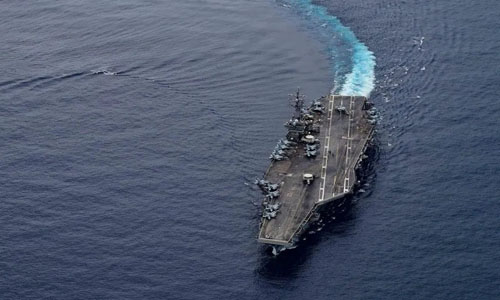by WorldTribune Staff, July 16, 2020
The new policy position of the United States, which rejects China’s claim to most of the South China Sea and the resources within, is being slammed by communist China’s propaganda outlets.
In reports on Wednesday, Chinese state media wondered if the U.S. government is “mentally retarded and slow in action.”

U.S. Secretary of State Mike Pompeo on Monday announced the rejection of Beijing’s claims to “offshore resources across most of the South China Sea” as “completely unlawful.” He also denounced China’s “campaign of bullying” of other nations with claims in the sea.
“In the South China Sea, we seek to preserve peace and stability, uphold freedom of the seas in a manner consistent with international law, maintain the unimpeded flow of commerce, and oppose any attempt to use coercion or force to settle disputes,” Pompeo said.
Pompeo said the Chinese Communist Party (CCP) has “no legal grounds to unilaterally impose its will on the region,” contending there is “no legal basis” for the infamous “Nine-Dashed Line” China draws on maps to give itself control of nearly the entire South China Sea. He cited the unanimous decision of a tribunal that ruled against China’s claims under the Law of the Sea Convention in 2016, a decision China has ignored.
Related: U.S. ultimatum: China’s ‘might make right’ behavior is ‘unlawful’, July 14, 2020
“The world will not allow Beijing to treat the South China Sea as its maritime empire. America stands with our Southeast Asian allies and partners in protecting their sovereign rights to offshore resources, consistent with their rights and obligations under international law. We stand with the international community in defense of freedom of the seas and respect for sovereignty and reject any push to impose ‘might makes right’ in the South China Sea or the wider region,” Pompeo said.
Hu Xijin, editor-in-chief of China’s state-run Global Times, tweeted: “The U.S. issued the statement four years after the South China Sea ruling. Is Washington mentally retarded and slow in action? Who can’t see you want to instigate ASEAN-China clash and make ASEAN the cannon fodder of U.S. strategy against China? Do you think other people are fools?”
Assistant Secretary of State for East Asia David Stilwell told an audience at the Center for Strategic and International Studies (CSIS) in Washington, D.C. on Tuesday that the United States will no longer stand by while China uses “gangster tactics” to impose its will on the South China Sea.
“We’re no longer going to stay neutral,” Stilwell said, promising “physical demonstrations of support” for the victims of Chinese bullying, including more freedom of navigation patrols (FONOP) and demonstrations of American military capability in the region.
On the same day Stilwell spoke, a U.S. Navy warship conducted the latest FONOP near the Spratly Islands.
“Unlawful and sweeping maritime claims in the South China Sea pose a serious threat to the freedom of the seas, including the freedoms of navigation and overflight, free trade and unimpeded commerce, and freedom of economic opportunity for South China Sea littoral nations,” the Navy said in a statement about the patrol.
China threatens response to U.S. sanctions over Hong Kong
China on Wednesday vowed to retaliate against “U.S. institutions and individuals” after President Donald Trump signed legislation and an executive order sanctioning Beijing for imposing a new national security law which puts an end to Hong Kong’s autonomy.
The Hong Kong Autonomy Act, which approves sanctions on Chinese officials and banks, as well as an executive order ending Hong Kong’s preferential trade treatment, was signed by Trump on Tuesday.
“Today I signed legislation, and an executive order to hold China accountable for its aggressive actions against the people of Hong Kong,” Trump told reporters at the White House Rose Garden. “Hong Kong will now be treated the same as mainland China. No special privileges, no special economic treatment and no export of sensitive technologies.”
China’s foreign ministry condemned the move, saying Beijing would protect “its legitimate interests” by imposing sanctions “against related U.S. institutions and individuals.”
Although the foreign ministry did not elaborate, Maryland Democrat Sen. Chris Van Hollen and Pennsylvania Republican Sen. Patrick Toomey, who introduced the Hong Kong Autonomy Act, were likely to be among the sanctioned individuals, Chen Long, a partner at the independent research agency Plenum, told the Hong Kong-based South China Morning Post.
The Hong Kong Autonomy Act and Trump’s executive order eliminate special treatment for Hong Kong passport holders and end an extradition agreement between Hong Kong and the U.S. The executive order eliminates joint U.S.-Hong Kong police training and revokes license exceptions for exports to Hong Kong.
It also ends cooperation between U.S. and Chinese agencies, such as the U.S. Geological Survey.
Intelligence Brief __________ Replace The Media
